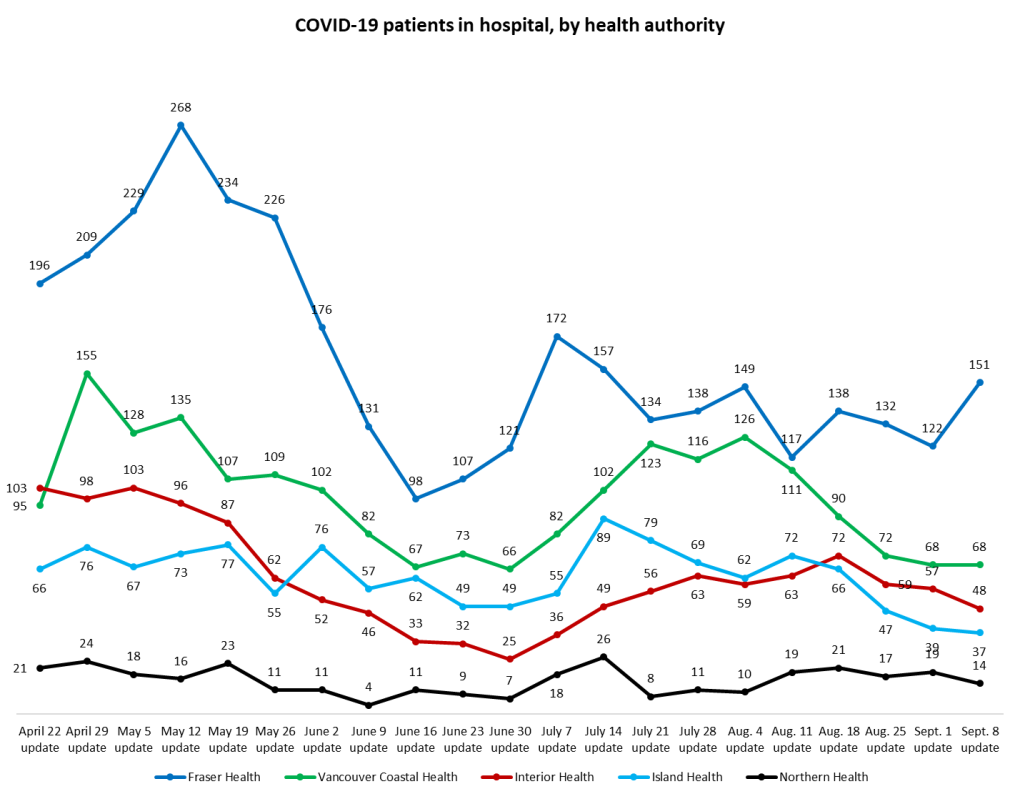The total number of patients with COVID-19 in B.C. hospitals surged to 324 on Thursday – an increase that can be traced entirely to one region of the province.
The latest data from the B.C. Centre for Disease Control shows the number of coronavirus-positive patients has decreased in most health authority regions since last week, and remained the same in Vancouver Coastal Health.

In Fraser Health, that number jumped from 122 to 151 – an increase of about 24 per cent.
Fraser Health is the most populous health authority region in the province, and has seen wilder swings in hospitalization numbers than others since the government began releasing data on a weekly basis back in April.
Hospitalization totals now include both patients who are admitted because of a serious COVID-19 infection and those who are admitted for other reasons and test positive incidentally.
The number of COVID-19 patients in intensive care units decreased to 22 Thursday.
Tracking coronavirus deaths has been more complicated since B.C. moved to a "30-day, all-cause mortality" reporting system, which includes every person who died within 30 days of testing positive for COVID-19 into the weekly total. Vital Statistics then works to determine whether the coronavirus was their underlying cause of death, a process that can take eight weeks.
The BCCDC preliminarily reported 22 deaths for the week ending on Sept. 3.
There were 617 lab-confirmed cases of the coronavirus reported that week, a total that only reflects people who were tested using a PCR test, and cases epidemiologically linked to them.
Since the vast majority of B.C. residents with COVID-19 symptoms don't qualify for a PCR test under the current guidelines, the weekly total is a fraction of actual transmission in the province – and independent modellers recently estimated the case counts are likely off by 100-fold.
Still, the number of reported cases has been declining for weeks. Hospitalizations have also seen an overall decline of about 24 per cent since mid-July.

But levels of COVID-19 in Metro Vancouver wastewater – another method used to get a rough sense of transmission – have been less promising in recent reports.
The latest COVID-19 Situation Report from the BCCDC notes that viral loads have "stabilized or begun to increase at some plants after falling from their most recent peak in late-June or early-July." That includes the plants in Vancouver and northwest Langley, which saw increases of 82 per cent and 51 per cent, respectively. The report does not include the Lions Gate plant, citing new concerns about unexpected variability in the readings.
"This may be due to unique features of the plant's operation, though the exact cause is under review. While under review, we have not included trends of these data," it reads.
The province administered another 20,464 doses of COVID-19 vaccine from Aug. 28 to Sept. 3, or about 2,923 per day. The biggest increase – 8,301 – was in second boosters.
Now that Health Canada has authorized Moderna's Omicron-targeting bivalent vaccine, the B.C. government expects to administer around 280,000 new doses per week by the end of September.
Officials unveiled their fall booster plans earlier this week, confirming the earliest appointments will be given to residents who are at higher risk of severe infection, such as the immunocompromised, and to those who have waited the longest since their last dose.

Post a Comment